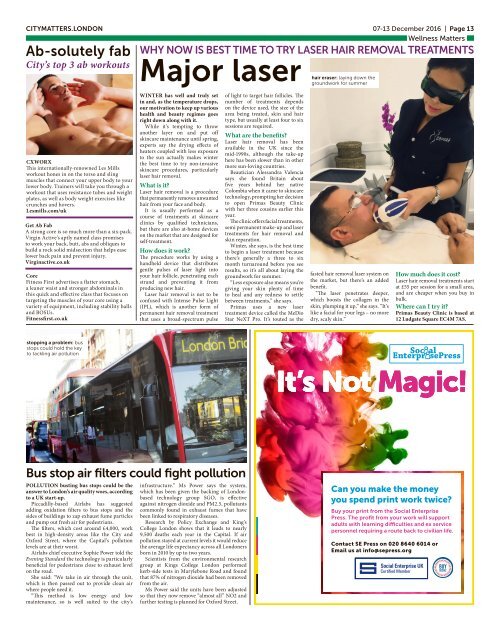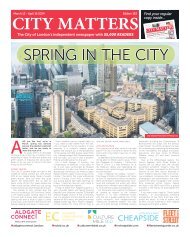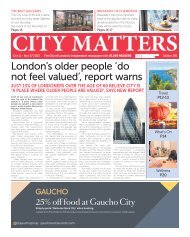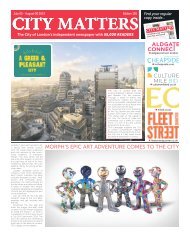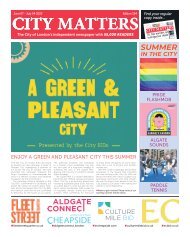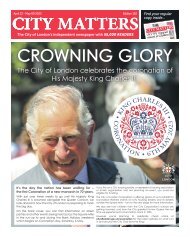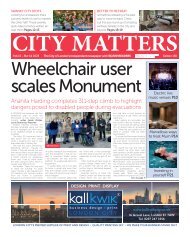City Matters Edition 012
City Matters Edition 012
City Matters Edition 012
Create successful ePaper yourself
Turn your PDF publications into a flip-book with our unique Google optimized e-Paper software.
CITYMATTERS.LONDON 07-13 December 2016 | Page 13<br />
Wellness <strong>Matters</strong><br />
Ab-solutely fab<br />
<strong>City</strong>’s top 3 ab workouts<br />
WHY NOW IS BEST TIME TO TRY LASER HAIR REMOVAL TREATMENTS<br />
Major laser<br />
hair eraser: laying down the<br />
groundwork for summer<br />
CXWORX<br />
This internationally-renowned Les Mills<br />
workout hones in on the torso and sling<br />
muscles that connect your upper body to your<br />
lower body. Trainers will take you through a<br />
workout that uses resistance tubes and weight<br />
plates, as well as body weight exercises like<br />
crunches and hovers.<br />
Lesmills.com/uk<br />
Get Ab Fab<br />
A strong core is so much more than a six-pack.<br />
Virgin Active’s aptly named class promises<br />
to work your back, butt, abs and obliques to<br />
build a rock solid midsection that helps ease<br />
lower back pain and prevent injury.<br />
Virginactive.co.uk<br />
Core<br />
Fitness First advertises a flatter stomach,<br />
a leaner waist and stronger abdominals in<br />
this quick and effective class that focuses on<br />
targeting the muscles of your core using a<br />
variety of equipment, including stability balls<br />
and BOSUs.<br />
Fitnessfirst.co.uk<br />
WINTER has well and truly set<br />
in and, as the temperature drops,<br />
our motivation to keep up various<br />
health and beauty regimes goes<br />
right down along with it.<br />
While it’s tempting to throw<br />
another layer on and put off<br />
skincare maintenance until spring,<br />
experts say the drying effects of<br />
heaters coupled with less exposure<br />
to the sun actually makes winter<br />
the best time to try non-invasive<br />
skincare procedures, particularly<br />
laser hair removal.<br />
What is it?<br />
Laser hair removal is a procedure<br />
that permanently removes unwanted<br />
hair from your face and body.<br />
It is usually performed as a<br />
course of treatments at skincare<br />
clinics by qualified technicians,<br />
but there are also at-home devices<br />
on the market that are designed for<br />
self-treatment.<br />
How does it work?<br />
The procedure works by using a<br />
handheld device that distributes<br />
gentle pulses of laser light into<br />
your hair follicle, penetrating each<br />
strand and preventing it from<br />
producing new hair.<br />
Laser hair removal is not to be<br />
confused with Intense Pulse Light<br />
(IPL), which is another form of<br />
permanent hair removal treatment<br />
that uses a broad-spectrum pulse<br />
of light to target hair follicles. The<br />
number of treatments depends<br />
on the device used, the size of the<br />
area being treated, skin and hair<br />
type, but usually at least four to six<br />
sessions are required.<br />
What are the benefits?<br />
Laser hair removal has been<br />
available in the UK since the<br />
mid-1990s, although the take-up<br />
here has been slower than in other<br />
more sun-loving countries.<br />
Beautician Alessandra Valencia<br />
says she found Britain about<br />
five years behind her native<br />
Colombia when it came to skincare<br />
technology, prompting her decision<br />
to open Primas Beauty Clinic<br />
with her three cousins earlier this<br />
year.<br />
The clinic offers facial treatments,<br />
semi permanent make-up and laser<br />
treatments for hair removal and<br />
skin reparation.<br />
Winter, she says, is the best time<br />
to begin a laser treatment because<br />
there’s generally a three to six<br />
month turnaround before you see<br />
results, so it’s all about laying the<br />
groundwork for summer.<br />
“Less exposure also means you’re<br />
giving your skin plenty of time<br />
to heal and any redness to settle<br />
between treatments,” she says.<br />
Primas uses a new laser<br />
treatment device called the MeDio<br />
Star NeXT Pro. It’s touted as the<br />
fasted hair removal laser system on<br />
the market, but there’s an added<br />
benefit.<br />
“The laser penetrates deeper,<br />
which boosts the collagen in the<br />
skin, plumping it up,” she says. “It’s<br />
like a facial for your legs – no more<br />
dry, scaly skin.”<br />
How much does it cost?<br />
Laser hair removal treatments start<br />
at £55 per session for a small area,<br />
and are cheaper when you buy in<br />
bulk.<br />
Where can I try it?<br />
Primas Beauty Clinic is based at<br />
12 Ludgate Square EC4M 7AS.<br />
stopping a problem: bus<br />
stops could hold the key<br />
to tackling air pollution<br />
It’s Not Magic!<br />
Bus stop air filters could fight pollution<br />
POLLUTION busting bus stops could be the<br />
answer to London’s air quality woes, according<br />
to a UK start-up.<br />
Piccadilly-based Airlabs has suggested<br />
adding oxidation filters to bus stops and the<br />
sides of buildings to zap exhaust fume particles<br />
and pump out fresh air for pedestrians.<br />
The filters, which cost around £4,000, work<br />
best in high-density areas like the <strong>City</strong> and<br />
Oxford Street, where the Capital’s pollution<br />
levels are at their worst.<br />
Airlabs chief executive Sophie Power told the<br />
Evening Standard the technology is particularly<br />
beneficial for pedestrians close to exhaust level<br />
on the road.<br />
She said: “We take in air through the unit,<br />
which is then passed out to provide clean air<br />
where people need it.<br />
“This method is low energy and low<br />
maintenance, so is well suited to the city’s<br />
infrastructure.” Ms Power says the system,<br />
which has been given the backing of Londonbased<br />
technology group SGO, is effective<br />
against nitrogen dioxide and PM2.5, pollutants<br />
commonly found in exhaust fumes that have<br />
been linked to respiratory diseases.<br />
Research by Policy Exchange and King’s<br />
College London shows that it leads to nearly<br />
9,500 deaths each year in the Capital. If air<br />
pollution stayed at current levels it would reduce<br />
the average life expectancy across all Londoners<br />
born in 2010 by up to two years.<br />
Scientists from the environmental research<br />
group at Kings College London performed<br />
kerb-side tests in Marylebone Road and found<br />
that 87% of nitrogen dioxide had been removed<br />
from the air.<br />
Ms Power said the units have been adjusted<br />
so that they now remove “almost all” NO2 and<br />
further testing is planned for Oxford Street.<br />
Can you make the money<br />
you spend print work twice?<br />
Buy your print from the Social Enterprise<br />
Press. The profit from your work will support<br />
adults with learning difficulties and ex service<br />
personnel requiring a route back to civilian life.<br />
Contact SE Press on 020 8640 6014 or<br />
Email us at info@sepress.org


